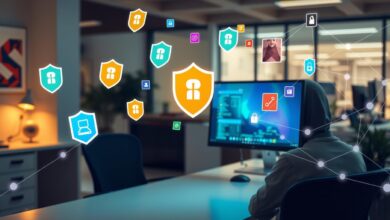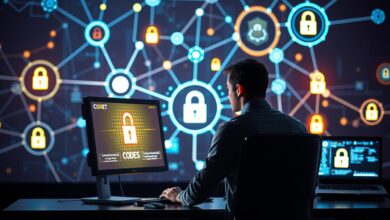Cybersecurity in the Workplace: Essential Practices for South African Businesses and Employees
South Africa is now a top spot for cybercrime, ranking third in the world.
This is a big worry for small and medium-sized enterprises (SMEs). They make up 90% of all businesses and employ over 60% of the workforce.
The cost of a data breach in South Africa is about R43 million. This shows how important good cybersecurity is. Ransomware attacks have gone up by 10% in the first quarter of 2023. This makes it even more crucial to protect sensitive business data.
The COVID-19 pandemic has made South African businesses more vulnerable to cyber threats. Now, they know they will face attacks, not just maybe. Seeing cybersecurity as a key investment, not just an extra cost, is essential. This article will look at key ways to protect business data. It aims to help both employees and management deal with cyber threats.
Understanding Workplace Cybersecurity in South Africa
Businesses in South Africa must understand the importance of cybersecurity. Cybercrime rates are rising, making it key to have a strong cybersecurity plan. This plan protects sensitive info and keeps operations running smoothly.
Many companies face cyber attacks, making these threats a major concern. It’s vital to have effective cybersecurity measures in place.
Importance of Cybersecurity for Businesses
Cyber attacks cost South Africa about R2.2 billion each year. This shows how crucial cybersecurity is for businesses. Almost 90% of companies have faced a security breach, highlighting the need for strong cybersecurity.
Many employees lack cybersecurity awareness, adding to the risks. Companies must invest in training to educate their staff.
Common Threats Facing South African Companies
South Africa sees many cyber threats, with malware and phishing being common. Over 20 million threats are reported each month. Businesses must act quickly to protect themselves.
Small companies often think they’re not at risk, but this is a dangerous mistake. They can be hit hard by cyber attacks.
To fight these threats, creating a cybersecurity culture is key. Companies should use email security, train employees regularly, and have a solid cybersecurity policy. South Africa also needs more cybersecurity training to fill the skills gap.
Key Cybersecurity Regulations and Compliance
In South Africa, cybersecurity is guided by important laws. These laws protect personal info and fight cybercrime. The Protection of Personal Information Act (POPIA) and the Cybercrimes Act are key. They help manage data and fight cyber threats.
Overview of POPIA and Its Implications
For businesses in South Africa, following POPIA is a must. This law sets rules for handling personal info. It makes sure privacy rights are kept safe.
If a company doesn’t follow POPIA, it could face big fines. So, it’s important to have strong data protection plans. Companies need to create detailed cybersecurity policies to meet POPIA standards. This helps keep customer data safe from hackers.
GDPR Relevance for South African Businesses
GDPR also impacts South African companies that work with EU clients. Not following GDPR can cause huge financial losses. This shows why it’s key for businesses to protect personal data well.
It’s important for companies to understand both POPIA and GDPR. Both laws focus on keeping sensitive info safe. They also make sure companies meet their legal duties to avoid security problems.
Best Practices for Cybersecurity in the Workplace
Keeping your workplace safe from cyber threats is key for South African businesses. By following the best practices, you can boost your defenses. This includes strong passwords, regular updates, and training for employees to prevent data breaches.
Implementing Strong Password Policies
Strong passwords are your first defense against cyber attacks. Encourage employees to mix letters, numbers, and symbols in their passwords. Change passwords often and don’t reuse them. Adding a second verification step can make your security even stronger.
Regular Software Updates and Patching
Keeping your software up-to-date is crucial. Make sure all software is updated and patched regularly. This helps protect against new threats and keeps your data safe. Regular updates can greatly reduce the risk of a data breach.
Employee Training and Awareness Programs
Training your employees on cybersecurity is essential. Teach them about threats like phishing and social engineering. This way, they can help protect your data. Regular training keeps everyone aware and helps prevent breaches.
The Role of IT Teams in Cybersecurity
IT teams are key to any organization’s cybersecurity. They help create a culture that values cybersecurity. This culture protects digital assets and teaches employees to keep information safe.
Building a strong cybersecurity culture means constant training and awareness. It’s about making sure everyone knows their role in keeping data secure.
Building a Cybersecurity-Centric Culture
A security-focused workplace is crucial for network security SA. Regular training sessions teach employees about new threats and how to avoid them. This training helps employees understand their role in keeping data safe.
By running cybersecurity awareness programs and simulations, teams can check how well employees know about risks. This makes everyone feel they can help protect the organization from cyber threats.
Importance of Incident Response Plans
Incident response planning SA is vital for a strong cybersecurity strategy. IT teams need to create, use, and update these plans quickly. A good plan outlines what to do during a cyber attack and how to review after it’s over.
Regular risk assessments find weaknesses in the organization. This makes the cybersecurity stronger overall.
Protecting Sensitive Data in the Workplace
In today’s digital world, keeping sensitive data safe is key for any company. Cyber threats are growing, thanks to new tech and clever hackers. So, it’s crucial to have strong plans to protect data and keep operations secure.
Data Encryption Essentials
Data encryption is a must for keeping information safe. It turns data into unreadable code for hackers. This makes data safe when stored or sent, helping to fight off cyber threats.
It’s important to keep encryption up to date. This helps protect against new types of cyber attacks.
Secure File Sharing Practices
Sharing files safely is important for keeping data safe everywhere. Companies should use tools like secure cloud services and encrypted channels. These tools help protect data when it’s shared.
It’s also key to teach employees about the dangers of unsafe sharing. This helps keep the company safe from data breaches.
Mobile Device Security for Employees
As work moves to remote settings, keeping mobile devices secure is key. It’s like protecting office computers, but for personal devices used through BYOD policies. Companies must act fast to keep data safe on personal devices.
Protecting Company Data on Personal Devices
Keeping company data safe on personal devices needs a few steps. Employers can set up security rules like:
- Password protection: Make sure all personal devices have strong passwords and use biometrics if possible.
- Data encryption: Encrypt data on mobile devices to stop unauthorized access.
- Security applications: Use mobile threat defense apps for alerts on suspicious activity.
- Regular updates: Keep all apps and systems up to date to fix security holes.
Best Practices for Mobile Application Usage
Safe app use is crucial for remote work security. Employees should follow these tips:
- Download apps from trusted sources: Stick to official app stores to avoid bad apps.
- Review app permissions: Make sure apps only ask for what they need.
- Use secure connections: Use VPNs on public Wi-Fi to access company resources.
- Report suspicious activity: Tell IT about any odd app behavior or security issues right away.
Strong mobile security plans help businesses stay safe while working remotely. This way, important data stays protected.
The Impact of Remote Work on Cybersecurity
The move to remote work has changed the workplace, bringing both benefits and challenges. It has made South African companies more open to cyber threats. With more people working from home, especially during the pandemic, cybersecurity worries have grown.
Risks Associated with Remote Work
Remote work comes with several risks, including:
- More chances of falling victim to phishing attacks because of insecure connections.
- Home networks often lack strong encryption, making them vulnerable.
- Personal devices might not get the latest security updates, leaving them exposed.
- Shared networks can lead to exposure to harmful apps.
- Access to sensitive data on devices not owned by the company is a risk.
Effective Home Office Security Measures
Companies need to develop strong cybersecurity policies to fight these risks. Good security steps include:
- Using Virtual Private Networks (VPNs) to keep remote connections safe.
- Regular security training for employees to boost their awareness.
- Using data encryption to protect information both in transit and at rest.
- Encouraging the use of secure devices and software for remote work.
- Running phishing simulations to prepare employees for cyber threats.
Utilizing Cybersecurity Tools and Technologies
In today’s digital world, South African businesses face many cyber threats. These threats can harm sensitive data and stop operations. It’s key to use strong cybersecurity tools and technologies to fight these dangers.
Antivirus and anti-malware solutions, firewalls, and Virtual Private Networks (VPNs) are crucial. Companies need to use all these tools together to stay safe.
Antivirus and Anti-malware Solutions
Antivirus and anti-malware tools are vital for protecting against harmful software. This software can cause data breaches and financial losses. With over 38 million Internet users in South Africa, the risk of cyber-attacks is high.
Kaspersky reports millions of cyber-attacks in 2020, costing South African companies over R2 billion. Good antivirus software can stop threats before they cause harm. This is especially important as more people work from home during the pandemic.
The Role of Firewalls and VPNs
Firewalls and VPNs are key for keeping connections safe, especially for remote workers. Firewalls block unwanted traffic. VPNs encrypt data, keeping it safe.
As cyber threats grow, using these tools is more important than ever. They help protect important data and keep organizations safe.
Incident Management and Response Strategies
Organizations must have strong incident management and response plans to deal with cyber breaches. Knowing the different types of incidents helps prepare for threats. With good incident response planning SA, companies can lessen damage and speed up recovery.
Steps to Take in the Event of a Breach
When a breach happens, follow a clear plan. Important steps include:
- Immediate Response: Tell the IT team right away to start the incident response plan. This ensures quick action and containment.
- Identification: Find out what kind of breach it is, like unauthorized access, insider threats, or phishing.
- Containment: Stop the breach’s spread by isolating affected systems or networks. This prevents more damage.
- Eradication: Get rid of the malicious elements, like malware or unauthorized users, to secure the system.
- Recovery: Bring back systems and data from safe backups. Apply patches or updates to stop future breaches.
Reporting Security Incidents Effectively
Good reporting is key in incident response planning SA. Companies should have clear rules for reporting security incidents. This ensures quick and accurate communication. Key points include:
- Documentation: Keep detailed records of the incident, like when it happened, what systems were hit, and what actions were taken.
- Internal Notifications: Tell important people, like management and legal teams, about the incident and its effects.
- Post-Incident Review: Review incidents after they’re fixed to learn from them. This helps improve strategies and adjust response plans.
The Future of Workplace Cybersecurity in South Africa
South African businesses face big challenges in the digital world. New tech like AI and machine learning is changing how they fight cyber threats. These tools help them catch problems fast and stop them before they start.
This shift is key to keeping up with South African cybercrime laws. It makes sure companies are both safe and follow the rules.
Emerging Trends and Technologies
Cloud computing is a big deal, but it brings its own set of problems. Companies need to be extra careful with data and watch out for insider threats. They also have to make sure data is safe when it’s moving around.
The rise of IoT devices makes things even trickier. Each device can be a doorway for hackers. To stay safe, companies are turning to Zero Trust and getting better at responding to threats.
The Evolving Landscape of Cyber Threats
The world of cyber threats is getting more complicated. With Cybercrime as a Service, even beginners can launch big attacks. Malware is getting smarter, making it hard for old security tools to keep up.
But, companies in finance, manufacturing, and retail are fighting back. They’re using new tech like blockchain and biometrics to protect themselves. With South Africa leading in cyber threats, it’s clear that cybersecurity is a top priority.
FAQ
What are the common cyber threats that South African businesses face?
South African businesses deal with threats like ransomware, phishing, and malware. They also face data breaches. It’s key for them to protect their data with strong cybersecurity.
How can businesses ensure compliance with POPIA?
Businesses must follow POPIA by making strong data protection policies. They should also do regular audits and train employees on handling personal info safely.
What should a cybersecurity policy include for South African businesses?
A good cybersecurity policy should cover data protection, employee training, and incident response. It should also include password policies and remote work security. Regular risk assessments are important too.
Why is employee training crucial for cybersecurity?
Employee training is key because mistakes can lead to cyber attacks. Teaching employees about phishing, passwords, and data handling helps protect against threats.
What practices should companies adopt for protecting sensitive data?
Companies should encrypt sensitive data and use secure file-sharing. They should also keep software up to date. Using cybersecurity tools is a good idea to prevent unauthorized access.
How can businesses prepare for a cyber incident?
Businesses should have incident response plans ready and updated. Training employees on what to do in a breach is crucial. Regular reviews of these plans help keep them effective.
What technologies can enhance cybersecurity for remote workers?
VPNs, firewalls, and antivirus solutions can boost cybersecurity for remote workers. These tools protect data, secure communications, and prevent unauthorized access.
How do GDPR regulations affect South African companies?
GDPR affects South African companies that handle EU citizens’ data. They must follow strict data protection rules and be transparent about data use to avoid penalties.
What are some best practices for password management in businesses?
Businesses should have strong password policies and use multi-factor authentication. They should also change passwords often and teach employees about unique passwords for each account.
What should be included in a training program for phishing awareness?
Phishing training should teach how to spot phishing emails and understand cybercriminal tactics. It should also cover what to do with suspicious emails. Regular workshops and tests help reinforce this knowledge.
Published on: 7 de December de 2024

Bakari Romano
Bakari Romano is a finance and investment expert with a strong background in administration. As a dedicated professional, Bakari is passionate about sharing his knowledge to empower individuals in managing their finances effectively. Driven by this mission, he founded FinancasPro.com, where he provides insightful and practical advice to help people make informed financial decisions. Through his work on the site, Bakari continues to make finance accessible and understandable, bridging the gap between expert knowledge and everyday financial needs.






